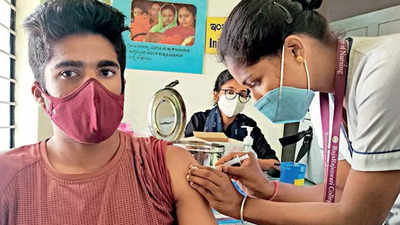- News
- City News
- mysuru News
- Karnataka: Zero Covid-19 cases in Chamarajanagar in past four days
Trending
This story is from November 5, 2021
Karnataka: Zero Covid-19 cases in Chamarajanagar in past four days
Chamarajanagar district, which shot into focus during the peak of the second wave after more than two dozen people died when the district Covid-19 hospital ran out of medical oxygen, has reported zero Covid-19 cases over the past four days.

Chamarajanagar has only five active cases, all in home isolation. As a result, the district hospital’s Covid ward is empty
MYSURU: Chamarajanagar district, which shot into focus during the peak of the second wave after more than two dozen people died when the district Covid-19 hospital ran out of medical oxygen, has reported zero Covid-19 cases over the past four days.
As on Thursday, the border district had only five active cases, all of whom were recovering in home isolation.As a result, the Covid-19 ward at the district hospital is now empty. The numbers have fallen although there has been no reduction in the number of tests being conducted. Between 800 and 1,200 tests, a large majority of which are RT-PCR, are conducted daily.
Ever since the pandemic broke last year, the district recorded a caseload of 33,002. Of these 32,477 have recovered and 502 died. The district had collected swab samples from 820 individuals on Wednesday, 549 on Tuesday, 942 on Monday and 1,138 on Sunday.
Dr Srinivas, surgeon, Chamarajanagar district hospital, said that while cases have fallen, people should continue to follow Covid-appropriate behaviour. “People should not forget to maintain social distance, wear masks and ensure hand hygiene since cases are still being reported in neighbouring districts of Mysuru and Mandya, besides neighbouring states like Kerala and Tamil Nadu,” he said.
Dr Sanjiv, dean and director, Chamarajanagar Institute of Medical Sciences, said healthcare workers have administered 9,79,275 doses of the vaccine so far. Of these, 6,23,626 comprise first-dose coverage and 3,55,649 people have been jabbed twice.
“Since various studies have shown vaccination has played a crucial role in significantly reducing infections and the spread of the virus, people should voluntarily come forward and get the shot,” Dr Sanjiv said. “Many individuals who received the first dose are not coming forward to take the second dose, despite local ASHA and anganwadi workers and other health volunteers following up and urging them to get fully inoculated,” he said.
As on Thursday, the border district had only five active cases, all of whom were recovering in home isolation.As a result, the Covid-19 ward at the district hospital is now empty. The numbers have fallen although there has been no reduction in the number of tests being conducted. Between 800 and 1,200 tests, a large majority of which are RT-PCR, are conducted daily.
Ever since the pandemic broke last year, the district recorded a caseload of 33,002. Of these 32,477 have recovered and 502 died. The district had collected swab samples from 820 individuals on Wednesday, 549 on Tuesday, 942 on Monday and 1,138 on Sunday.
Dr Srinivas, surgeon, Chamarajanagar district hospital, said that while cases have fallen, people should continue to follow Covid-appropriate behaviour. “People should not forget to maintain social distance, wear masks and ensure hand hygiene since cases are still being reported in neighbouring districts of Mysuru and Mandya, besides neighbouring states like Kerala and Tamil Nadu,” he said.
Dr Srinivas added: “During the peak of the second wave in Kerala, the district administration had strictly screened people at the border. People must still abide by all Covid precautionary measures.”
Dr Sanjiv, dean and director, Chamarajanagar Institute of Medical Sciences, said healthcare workers have administered 9,79,275 doses of the vaccine so far. Of these, 6,23,626 comprise first-dose coverage and 3,55,649 people have been jabbed twice.
“Since various studies have shown vaccination has played a crucial role in significantly reducing infections and the spread of the virus, people should voluntarily come forward and get the shot,” Dr Sanjiv said. “Many individuals who received the first dose are not coming forward to take the second dose, despite local ASHA and anganwadi workers and other health volunteers following up and urging them to get fully inoculated,” he said.
End of Article
FOLLOW US ON SOCIAL MEDIA










